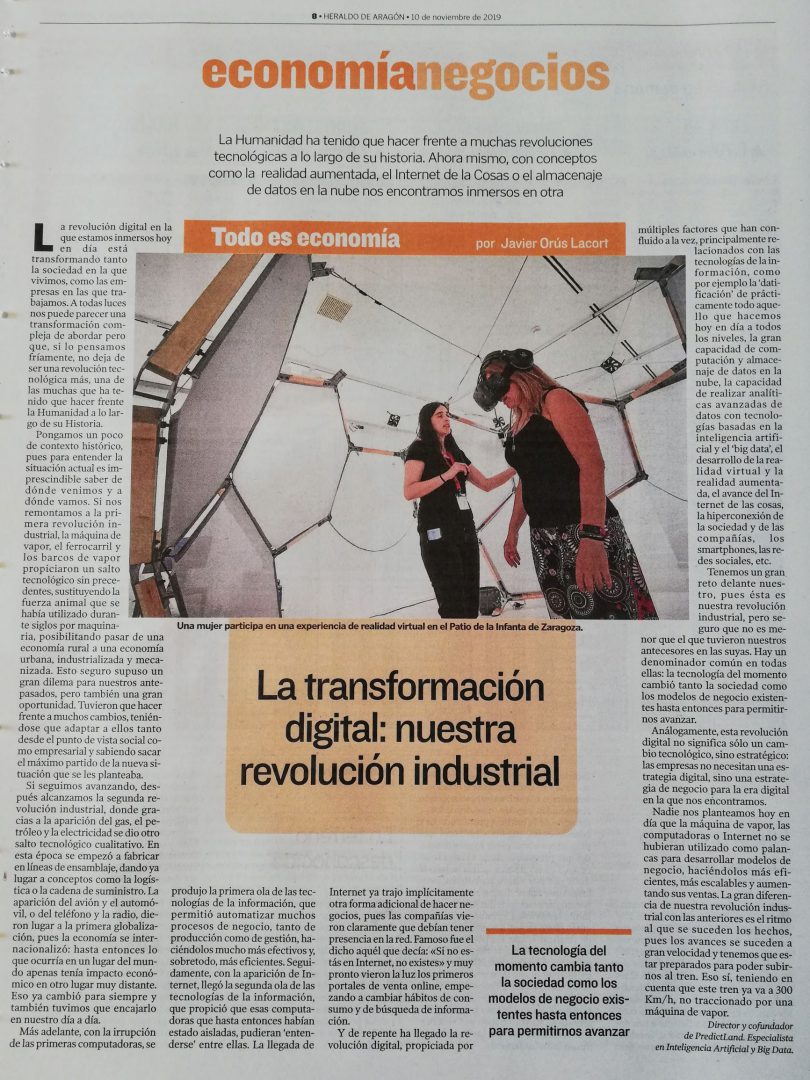Here is an article written by our Director and Co-Founder Javier Orús Lacort for the Economy and Business section of the Heraldo de Aragón, published on November 10, 2019.
We hope you like it!

We reproduce here the published text:
The Digital Revolution in which we are immersed today is transforming both the society in which we live and the companies in which we work. At first glance, it may seem a complex transformation to tackle, but if we think about it coldly, it is just another technological revolution, one of the many that humanity has had to face throughout its history.
Let’s put some historical context, because to understand the current situation it is essential to know where we come from and where we are going. If we go back to the First Industrial Revolution, the Steam Engine, the Railroad and Steamships brought about an unprecedented technological leap, replacing the animal power that had been used for centuries with machinery, making it possible to move from a rural economy to an urban, industrialized and mechanized economy. This surely posed a great dilemma for our ancestors, but also a great opportunity. They had to face many changes, having to adapt to them both from a social and business point of view and knowing how to make the most of the new situation they faced.
If we continue moving forward, we then reach the Second Industrial Revolution, where, thanks to the appearance of Gas, Oil and Electricity, another qualitative technological leap was made. At this time, manufacturing began to take place on assembly lines, giving rise to concepts such as Logistics and Supply Chain. The appearance of the airplane and the automobile, or the telephone and the radio, gave rise to the First Globalization, since the Economy became internationalized: until then, what happened in one part of the world had hardly any economic impact in another very distant place. That changed forever and we also had to fit it into our daily lives.
Later, with the irruption of the first computers, the First Wave of Information Technologies took place, which made it possible to automate many business processes, both in production and management, making them much more effective and, above all, more efficient. Then, with the advent of the Internet, came the second wave of information technology, which made it possible for these computers, which until then had been isolated, to “understand” each other. The arrival of the Internet implicitly brought with it an additional way of doing business, as companies clearly saw that they had to have a presence on the network. The saying “If you are not on the Internet, you don’t exist” became famous, and very soon the first online sales portals appeared, beginning to change consumer and information search habits.
And suddenly the Digital Revolution has arrived, brought about by multiple factors that have come together at the same time, mainly related to Information Technology, such as the “Datification” of practically everything we do today at all levels, the large computing and data storage capacity in the Cloud, the ability to
to perform Advanced Data Analytics with technologies based on Artificial Intelligence and Big Data, the development of Virtual Reality and Augmented Reality, the advance of the Internet of Things, the “hyperconnection” of Society and Companies, smartphones, social networks, etc.
We have a great challenge ahead of us, as this is our “Industrial Revolution”, but it is certainly no less than that of our predecessors in theirs. There is a common denominator in all of them: the Technology of the moment changed both Society and the Business Models existing until then to allow us to move forward.
Similarly, this Digital Revolution does not only mean a technological change, but a strategic one: Companies do not need a “Digital Strategy”, but a “Business Strategy” for the Digital Era in which we find ourselves.
No one today would think that the Steam Engine, computers or the Internet would not have been used as levers to develop Business Models, making them more efficient, more scalable and increasing their sales. The big difference between our “Industrial Revolution” and the previous ones is the pace at which the events are happening, because the advances are happening at great speed and we have to be prepared to be able to get on the train. Of course, taking into account that this “train” is already going at 300 Km/h, not driven by a steam engine.



